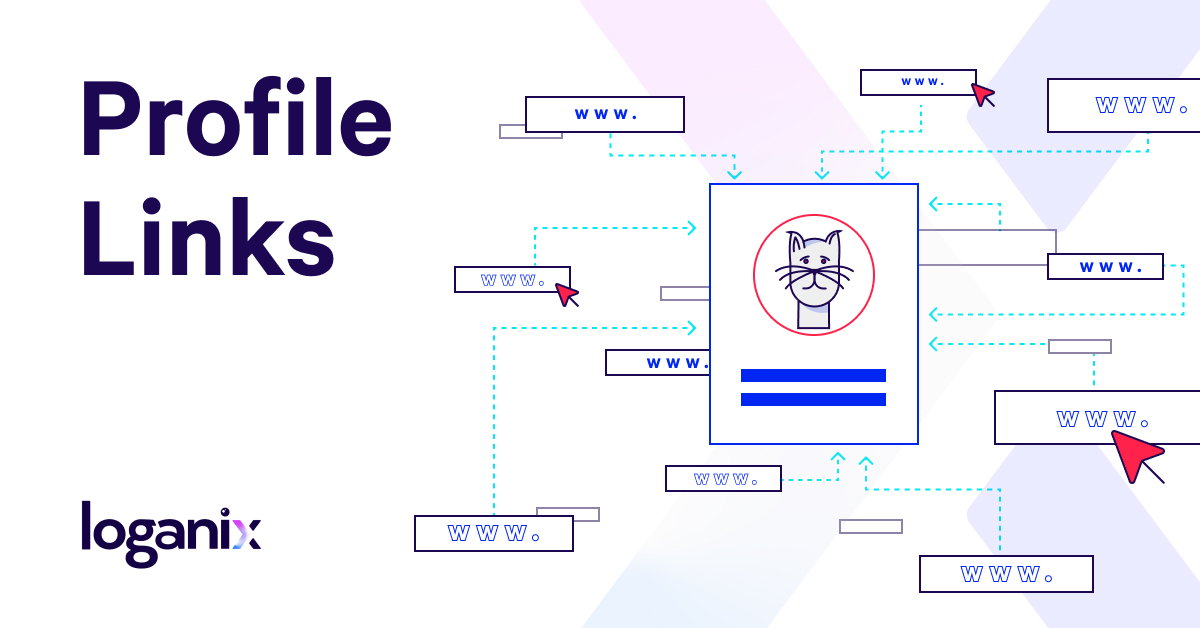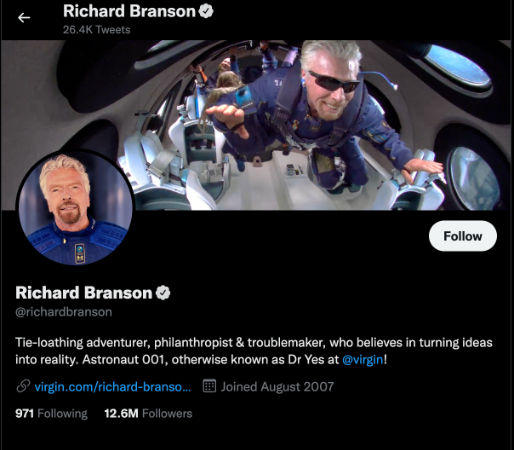What Are Profile Links? (+ Do They Matter for SEO?)

Hand off the toughest tasks in SEO, PPC, and content without compromising quality
Explore ServicesYoutube, Facebook, and Twitter are the three most visited websites after Google. Being incredibly popular, high-DA sites, a link from them must be like striking SEO gold!
That’s the thinking behind profile links. These are links that can be placed in your bio on public profile websites. The idea is that since these are backlinks from high-DA sites, they should have a very positive impact on SEO.
What Are Profile Links?
Profile links are backlinks you can create to your website in various public profiles. For example, Richard Branson has a profile link pointing to Virgin’s website in his Twitter bio:

Image Source: Twitter
Profile links can come from massively popular websites like Facebook and Twitter, but there are also countless other websites online on which profiles, and therefore profile links, can be created. Many of these other sites may even be more relevant to your niche than something like Facebook, which isn’t dedicated to any single niche or industry.
For example, if you have a company that sells workout supplements and protein powders, there are lots of fitness websites and forums that may be reputable and have a high domain authority (DA) score, in addition to being in the same industry as you.
In theory, your profile links on these websites should send a positive signal to Google that your site is relevant and authoritative in the fitness niche, and that it should therefore rank more highly in the search engine results pages (SERPs) for the fitness-related keywords you are targeting.
But do profile links really work like other backlinks when it comes to SEO?
Profile Links and SEO
When one site links to another and Google’s bots crawl that link, a certain amount of “link juice” gets passed along. This refers to the size of the positive ranking signal that Google will attribute to the target site. A backlink from a popular, authoritative, high-traffic site that is in the same niche as you can pass a lot of link juice, creating a larger positive signal and helping you move further up the SERPs.
Conversely, a link from a small, low-DA, relatively unknown website will pass very little link juice, having a negligible impact on your SEO rankings.
However, the linking domain isn’t the only fact that impacts link juice. It also matters where on that website a link appears. A backlink placed in the body of a piece of content, where it organically fits with the content and provides added value to the reader, is worth more than, say, an author bio link.
Google’s algorithm is very good at determining high-value links. These appear natural and organic, are contextual, and provide value to the reader.
Profile links, unfortunately, don’t quite meet these criteria even if they are totally above-board and not the product of any kind of link-building scheme. They may not hurt your SEO, and they may help a little, but don’t expect profile links to skyrocket your rankings even if they come from high-DA, relevant websites.
Another point to consider is that on some websites, profile links will automatically be “nofollow” links. Nofollow is a tag that Google created so that users can indicate when a link was not placed naturally, and therefore it shouldn’t be used to pass link juice. For example, it’s okay to publish sponsored content with paid links, as long as those links have a nofollow tag. If the website on which you’ve created a profile automatically has profile links tagged with nofollow, those links won’t pass any link juice.
Of course, like many of Google’s processes, the exact rules for how profile links are interpreted are opaque. There may be some minor SEO benefits, but it isn’t likely to be very large.
Benefits of Profile Links
Just because profile links aren’t going to take you to the top of the SERPs overnight doesn’t mean they don’t have some benefits.
Small rankings bump
For starters, some profile links on certain websites may round out your backlink profile and give your rankings a little boost. Hey, everything counts! It may not be huge, but there are plenty of successful websites whose backlink profile includes profile links.
Referral traffic
Probably more significant than the small rankings bump, profile links on the right website can drive more referral traffic to our site. If a profile link doesn’t earn you a higher ranking in Google’s SERPs but it drives regular organic traffic to your website, that’s hardly a loss.
As long as you aren’t posting backlinks all over the place in a spammy way, profile links are a perfectly appropriate way to gain more visibility for your business.
Become an authority
If you are active in your online community and provide genuine value to others through your contributions and participation in conversations, more people in your niche will view you as an authoritative resource. This can open up opportunities for guest blogging and other collaborations that can potentially help your SEO efforts.
Profile Links Best Practices
As with just about any other link-building practice, there is a right way and a wrong way to go about it. Google is very competent at sniffing out link schemes and inauthentic, spammy attempts at gaming the system to improve your SERP rankings, and the same applies to profile links.
Keeping these best practices in mind will ensure that your profile links help your business efforts without putting your rankings at risk.
Choose the right sites
The sites you’re associated with online are taken into account by Google’s algorithm, so it’s important to keep good company no matter how you are interacting with a site.
Getting a bunch of low-quality backlinks on a website that nobody visits and that only exists to sell backlinks is going to send up red flags for Google, indicating that your backlink profile may be full of inauthentic links.
While simply creating profiles on low-quality sites may not be quite as serious an offense, it still won’t help your reputation from Google’s perspective. Aim to create profile links only on websites with which you’re happy to be associated. They should be relevant to your niche, reputable, and exist for more than just cheap profile link creation.
Don’t keyword stuff
The anchor text used in link building, including profile links, has the potential to send Google a message that your links are spammy and inauthentic.
It used to be considered standard SOP practice to try to use the keywords you are targetting in your anchor text whenever possible. The thinking was that if those keywords are used to link to your page frequently, that page must be a great example of those keywords and should appear high in the SERPs for queries that include them.
For example, a landscaping company in Tulsa might try to create a bunch of backlinks using the anchor text “best Tulsa landscaping.” The problem is that most people don’t naturally speak in keyword queries, so Google adjusted its algorithm to favor backlinks with a wide range of natural, descriptive anchor texts.
The same holds for any profile links. If there is a field in which to enter a URL of your choice, simply enter it without anchor text. If you can include a link with anchor text, consider using your brand name, since this makes the most sense in the context of a profile.
Quality listings are your friend
While listing citations and profile links are not exactly the same thing, they do share some similarities and the benefits of each can be confused. Listings are entries in directories such as Yelp and YellowPages.
Similarly to profile links, they can be viewed by the public and may have some basic contact information. However, unlike profile links, they don’t generally exist on niche-specific websites or forums, but rather on general websites that are meant to serve as directories for a wide range of businesses.
While low-quality directories should be avoided at all costs since they can meaningfully hurt your SEO rankings, creating a listing or profile on high-quality directories is a must. These citations, provided they are consistent and match the information on your website, can give you a major boost in local SEO rankings.
Forget about message board links
Often, the same websites on which you can create profile links will also contain forums and message boards. This is particularly true for niche-specific websites or blogs where people can get together and discuss shared interests.
Back in the earlier days of SEO, it wasn’t just profile links that were created en masse in an attempt to boost search rankings, but message comments would also be used to the same end. Often, messages wouldn’t even have anything to do with the forum subject, but would include a bunch of backlinks. It’s not even worth attempting this link-building scheme anymore, since Google doesn’t generally make message board or blog comment links into account anymore.
Summary
If your goal is to climb the SERPs, building profile links isn’t going to get you very far. They may provide a minor SEO bump in some cases, but it won’t generally be meaningful enough to move the needle. However, profile links on the right website can still help your website gain visibility and referral traffic.
Instead, focusing on developing a winning content strategy and building links in high-authority websites can help you reach your SEO goals. You don’t have to do it alone: Loganix can take SEO off your plate, so you can stay focused on growing your business.
Hand off the toughest tasks in SEO, PPC, and content without compromising quality
Explore ServicesWritten by Adam Steele on December 14, 2022
COO and Product Director at Loganix. Recovering SEO, now focused on the understanding how Loganix can make the work-lives of SEO and agency folks more enjoyable, and profitable. Writing from beautiful Vancouver, British Columbia.





